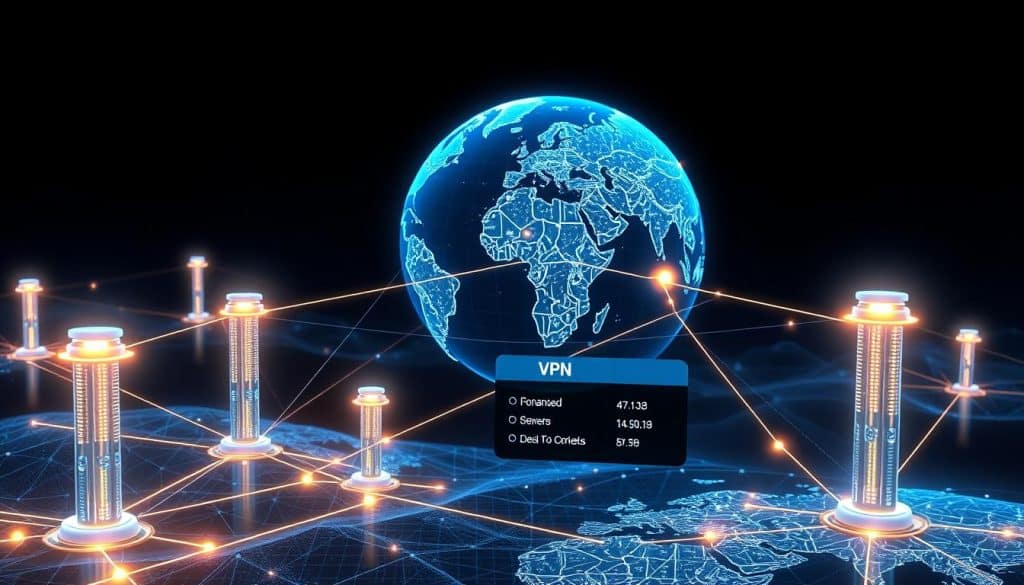
Is Your VPN Working? Here’s How to Check
31% of internet users worldwide use VPNs to protect their online privacy. Many aren’t sure if their VPN is working properly. Learning how to test your VPN is vital for security and encryption123.
Forest VPN offers access to over 50 locations in 30+ countries. Users can easily switch between Netflix regions for seamless streaming1. At $3.99 per month, Forest VPN is affordable and reliable2.
Forest VPN stands out with its eco-friendly technology. It reduces CO2 emissions, appealing to environmentally conscious users12. A 7-day free trial lets you test the VPN before committing3.
Wondering if your VPN is working correctly? This guide will help you verify its performance. We’ll cover checking your IP address and testing for leaks.
You’ll learn how to troubleshoot common issues. We’ll also ensure your VPN encryption is active for confident browsing.
Key Takeaways
- Learn how to perform a VPN functionality test
- Understand the importance of secure VPN connections
- Discover methods to verify VPN encryption
- Explore Forest VPN’s features and global server network
- Find out how to troubleshoot common VPN issues
- Learn about eco-friendly VPN options
Understanding VPN Functionality
VPNs are vital for protecting your online activities. They create a secure tunnel between your device and the internet. This masks your real IP address and encrypts your data.
What is a VPN?
A VPN routes your internet traffic through an encrypted connection to a remote server. This hides your actual location and makes it seem like you’re browsing from elsewhere. Many providers, including Forest VPN, offer servers in over 30 countries1.
How VPNs protect your online privacy
VPNs safeguard your privacy by encrypting your internet traffic. This makes your data unreadable to outsiders, even if intercepted. Forest VPN ensures that any intercepted data remains undecipherable4.
VPNs also mask your IP address. This makes it hard for websites to track your real location or identity.
Common VPN protocols and their features
VPN protocols govern how your data is transmitted. Popular protocols include OpenVPN, IKEv2, and WireGuard. Each has unique strengths in security, speed, or efficiency.
- OpenVPN: Known for its robust security and flexibility
- IKEv2: Offers fast speeds and is ideal for mobile devices
- WireGuard: A newer protocol praised for its simplicity and efficiency
Some VPNs, like Forest VPN, offer split tunneling. This feature secures sensitive activities while allowing regular internet use for others. It enhances both security and convenience4.
Signs Your VPN Might Not Be Working
Spotting VPN issues is key for online safety. Look out for these warning signs if your VPN seems off. Your privacy might be at risk.
An unchanged IP address is a big red flag. Your IP should show a new location when the VPN is on. Check it using online IP lookup tools.
Trouble accessing geo-restricted content? That’s another sign. A good VPN should bypass these limits easily. If you can’t, something’s wrong1.
Sudden internet slowdowns can point to VPN problems. Some speed loss is normal, but big drops aren’t. Compare speeds with and without the VPN using test tools.
| Sign | What It Means | How to Check |
|---|---|---|
| Unchanged IP | VPN not routing traffic | Use online IP lookup tools |
| Geo-restriction issues | VPN not masking location | Try accessing region-specific content |
| Significant speed loss | VPN connection problems | Perform speed tests |
DNS leaks can expose your browsing activity. They happen when DNS requests skip the VPN. Use leak test sites to check if your VPN handles DNS correctly.
Noticed these signs? Time to troubleshoot your VPN. Forest VPN offers round-the-clock support for tech issues1. Keep your VPN updated and configured right.
This helps prevent common problems. Your online activities will stay private and secure5. Regular maintenance goes a long way in VPN performance.
How Do I Know If My VPN Is Working?
Ensuring your VPN works properly is key to protecting your online privacy. Here are some effective ways to check your VPN’s performance.
Check your IP address
Start by comparing your IP address before and after connecting to the VPN. Visit a trusted IP checking website with your VPN off. Note your IP, then connect to the VPN and check again.
A change in IP confirms your VPN is working correctly. This simple test is crucial for verifying your VPN’s effectiveness.
Verify DNS leak protection
DNS leak protection keeps your online activities private. Use specialized tools to ensure your DNS requests go through the VPN tunnel. This check helps confirm your internet provider can’t see your browsing history.
Test for WebRTC leaks
WebRTC leak tests ensure your real IP isn’t exposed during browser-based communications. Use online checkers to verify your VPN masks your actual IP during these connections.
Regular testing helps maintain your VPN’s effectiveness. Forest VPN offers over 50 server locations across 30+ countries for secure connections1.
Forest VPN provides 24/7 customer support and a strict no-logging policy. This ensures your online activities stay private and secure1. Checking your VPN regularly boosts your online privacy and security.
VPN Connection Status Indicators
Knowing your VPN connection status is vital for security. Most VPN software offers visual cues to verify if your VPN works properly.
A green checkmark or “Connected” message usually indicates an active VPN. Some VPNs show more details about your connection:
- Server location
- Protocol in use
- Connection duration
- IP address
These indicators confirm your VPN’s proper function. Forest VPN’s user-friendly apps for iOS and Android make status checks easy6.
Learn your VPN’s specific indicators. This helps you spot issues quickly and ensure secure browsing. A working VPN protects privacy and enables smooth streaming6.
Regular status checks maintain a secure VPN connection. This gives peace of mind while browsing, streaming, or working online.
Performing a VPN Speed Test
VPN speed tests are vital for checking your VPN’s performance. They show if your VPN works well and delivers needed speeds. These tests help you enjoy smooth online activities.
Importance of speed testing
Regular VPN speed tests ensure top performance. They spot slow connections or server issues. These tests also help compare VPN services and find the fastest options.
Recommended speed testing tools
Several tools can help you test VPN speed. Popular choices include:
- Ookla’s Speedtest.net
- Fast.com
- SpeedOf.Me
- TestMy.net
These tools measure download and upload speeds, plus ping rate. They’re user-friendly and give accurate results for VPN performance.
Interpreting speed test results
When reviewing VPN speed test results, keep these factors in mind:
| Factor | Impact on VPN Performance |
|---|---|
| Server distance | Longer distances can lead to slower speeds |
| Network congestion | Peak hours may result in reduced speeds |
| VPN protocol | Different protocols offer varying speeds and security levels |
| Internet Service Provider | Your base internet speed affects VPN performance |
A big speed drop with VPN might signal problems. You may need to switch servers. Forest VPN offers over 50 server locations worldwide3.
Forest VPN provides fast, reliable connections for smooth streaming and gaming3. It helps you find the best performance for your needs.
Verifying VPN Server Locations
Checking your VPN server location is vital for privacy and accessing geo-restricted content. It ensures you’re connecting to the right place. Some tools can help confirm your apparent online location.
Ipleak.net is a popular tool for VPN server location verification. It shows your IP address and perceived location. If you’re connected to New York but ipleak.net shows London, something’s wrong.
Some VPNs may not accurately represent their server locations. This can affect service reliability and user trust. Forest VPN offers over 50 locations across 30+ countries for changing regions1.
To verify your VPN location, follow these steps:
- Connect to your chosen VPN server
- Visit ipleak.net or a similar IP checking tool
- Compare the displayed location with your selected server
- If they don’t match, try a different server or contact support
Accurate server locations are key for bypassing geo-restrictions. You’ll need a reliable VPN with servers in the right location. This is crucial for streaming content like Rina’s ETA in Netherlands.
Regularly check your VPN server location. It helps maintain your online privacy and security. This simple habit ensures your VPN works as intended.
Troubleshooting Common VPN Issues
VPN troubleshooting can be tricky. Knowing how to tackle common connection issues is crucial. Let’s explore some frequent problems and their solutions.
Connection Drops
Sudden disconnections can be frustrating. They often stem from domain name resolution problems or server overload. Try switching to a less crowded server to fix this.
Forest VPN offers over 50 server locations across 30+ countries. This gives you plenty of options to choose from718.
Slow Speeds
Sluggish connections can ruin your online experience. Outdated VPN software is a common culprit. Keep your Forest VPN client up-to-date for optimal performance.
The service provides automatic updates. This makes the process hassle-free8.
Incompatibility with Certain Websites
Some websites may not work properly with your VPN. In such cases, try these steps:
- Clear your browser cache
- Use split tunneling on Android devices to select which apps use the VPN
- Whitelist Forest VPN in your firewall and antivirus settings18
If issues persist, don’t hesitate to reach out. Forest VPN’s 24/7 customer support is ready to help. They can assist with any connection issues you might face1.
| Issue | Possible Cause | Solution |
|---|---|---|
| Connection Drops | Server Overload | Switch to Less Crowded Server |
| Slow Speeds | Outdated Software | Update VPN Client |
| Website Incompatibility | Cache/Firewall Issues | Clear Cache, Whitelist VPN |
Ensuring Your VPN’s Encryption is Active
Checking your VPN encryption is vital for a secure connection. Cyber attacks often exploit weak VPN connections. It’s crucial to make sure your protection is working9.
Look for encryption status indicators in your VPN client. Many providers offer tools to test encryption strength. These tools work like endpoint protection for devices10.
Visit HTTPS websites and check for the padlock icon in your browser. This shows that encryption is working correctly. Most cybersecurity experts suggest using VPNs for safe browsing9.
“A properly encrypted VPN is your first line of defense against cyber threats.”
Use strong VPN services like NordVPN or ExpressVPN. They offer advanced security and fast servers. Other providers like Private Internet Access and Proton VPN also focus on encryption11.
By doing this, you join the trend of secure internet use. VPN traffic grows by 15% yearly. The market could reach $107.5 billion by 20289.
Conclusion
Regularly testing your VPN is vital for online privacy and security. Learn to verify IP addresses and check for leaks. This ensures your VPN protects you effectively. Forest VPN offers over 50 locations for fans to connect to12.
A secure VPN is crucial for safe internet use. Forest VPN has servers in 50+ locations across 30+ countries. Users can access different Netflix libraries while enjoying a strict no-log policy1.
Staying informed about VPN technology enhances online safety. Forest VPN’s user-friendly interface allows quick connections for sports fans. Carlos and Anna can enjoy seamless streaming experiences12.
Forest VPN provides 24/7 customer support and innovative battery-saving technology. This comprehensive solution offers both security and convenience for users1.


Sorry, the comment form is closed at this time.